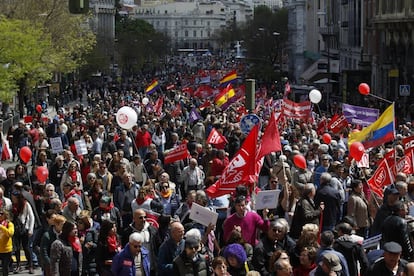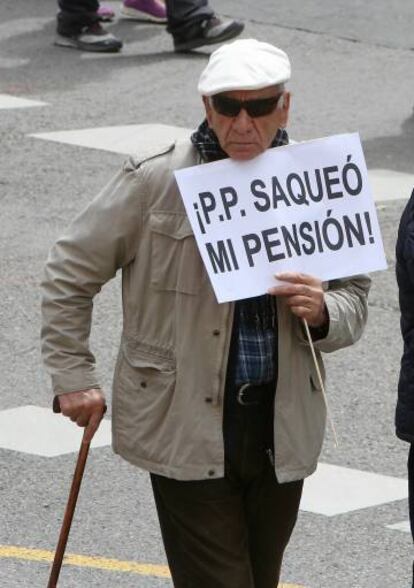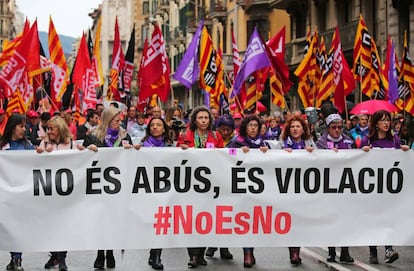Thousands march across Spain on May Day marked by women’s rights
Unions warn that failure to improve wages and reduce job precariousness could lead to social unrest

The gender pay gap and pensions were the overriding themes at the rallies held across Spain to observe International Workers Day on Tuesday.

Thousands of people marched in all the major cities in demonstrations that were largely organized by Spain’s two main labor unions, CC OO and UGT. Workers’ representatives are calling for pay hikes to reflect the rising cost of living, and warning that failure to more evenly redistribute the wealth of an improving economy could result in social unrest.
Camil Ros, secretary general of UGT in Catalonia, on Tuesday dropped hints about the possibility of a nationwide stoppage. “It is necessary to change the Popular Party [PP] government through mobilizations, and if necessary, a general strike,” he said.
Women’s rights took center stage this year, riding high on a wave of public support. Spain was the only country to organize a national strike on March 8, International Women’s Day, and feminist groups last week led nationwide protests over the verdict in a recent rape trial. In Barcelona and elsewhere, many protesters held signs that referenced the trial, known as the La Manada case.

“On this May 1, the big stars of the day are the fight for pensions and, above all, feminism,” tweeted Iñigo Errejón, a top official at the anti-austerity Podemos party. “This is the guarantee of a dignified country, one with a future, with equality and with rights. Pride!”
Este #1deMayo los grandes protagonistas son la lucha por pensiones y, sobre todo, el feminismo. Aquí está la garantía de un país digno: con futuro, igualdad y derechos ¡Orgullo! pic.twitter.com/MTjTe7MKFu
— Íñigo Errejón (@ierrejon) May 1, 2018
Unai Sordo, the head of CCOO, asked “for the streets to fill up with people in order to shake up the comfort zone that [employers’ associations] CEOE and Cepyme are basking in thanks to the government’s labor reform.”
“We are aware that street mobilizations are the leverage that enables policy changes,” said Pepe Álvarez, secretary general of UGT. “Spain hasn’t been in a situation like this in a long time,” he added, alluding to recent protests to demand gender equality and better pensions.
In April, the leaders of CCOO and UGT warned that unless something is done to improve wages and reduce precariousness, it could lead to social unrest.

“We are starting to see indignation, anger and impotence. Either growth is shared out, or there’s going to be conflict,” warned Sordo and Álvarez at the time.
Spain’s third-largest union, USO, said it will seek pay raises based on the CPI cost-of-living index plus four percentage points.
“They’re selling us the story of an economic recovery that is not reaching the workers,” said USO leader Joaquín Pérez, who also had words of criticism for the two big labor unions. “They’ve proven that they have not been especially useful as a counterweight.”
EC contradicts Rajoy
The European Commission has rebuked the Spanish government’s claims that it has no responsibility in reducing the gender pay gap. “It is up to the States to address the causes, and the Commission provides assistance through financial aid,” said the executive branch of the EU in a parliamentary response.
In January, Prime Minister Mariano Rajoy was asked by a radio journalist about his thoughts on the fact that Spanish women earn 85.1% of their male colleagues’ salaries, according to Eurostat figures. His reply was: “Let’s not go into that. Governing officials must be very careful about not overstepping our authority, and there is certainly no government mandate to equate salaries.” His words sparked an angry reaction, and Rajoy retracted and promised to “fight all the battles” against inequality.
English version by Susana Urra.
Tu suscripción se está usando en otro dispositivo
¿Quieres añadir otro usuario a tu suscripción?
Si continúas leyendo en este dispositivo, no se podrá leer en el otro.
FlechaTu suscripción se está usando en otro dispositivo y solo puedes acceder a EL PAÍS desde un dispositivo a la vez.
Si quieres compartir tu cuenta, cambia tu suscripción a la modalidad Premium, así podrás añadir otro usuario. Cada uno accederá con su propia cuenta de email, lo que os permitirá personalizar vuestra experiencia en EL PAÍS.
¿Tienes una suscripción de empresa? Accede aquí para contratar más cuentas.
En el caso de no saber quién está usando tu cuenta, te recomendamos cambiar tu contraseña aquí.
Si decides continuar compartiendo tu cuenta, este mensaje se mostrará en tu dispositivo y en el de la otra persona que está usando tu cuenta de forma indefinida, afectando a tu experiencia de lectura. Puedes consultar aquí los términos y condiciones de la suscripción digital.








































